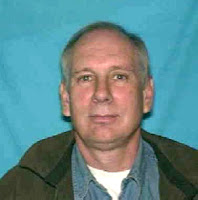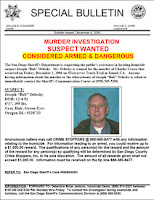
The San Diego Sheriff’s Department has identified a suspect in the murder of Charles Crow — a local man named Joseph “Bob” Orlosky (mug shot at right), who owns or has an interest in property on Wisecarver Truck Trail, near where the crime occurred.
The press reports about this murder have been skimpy and inconsistent, as have the comments on this blog (see my earlier posts here and here). Of all the various speculations I’ve run across, the one that seems most plausible to me is that the three men in the truck were out “four wheeling", just for fun, on what they believed was a road they had a right to be on. In this hypothetical scenario, Bob Orlosky got angry about these four wheelers because (rightly or wrongly, as the case may be) he believed they didn’t have a right to be there.
The complete special bulletin is at right. Click on the picture to get a full-sized view, or click here to see the original.
The above scenario seems most plausible to me because I witnessed something very much like this (without, of course, the violent ending) on my neighbor’s property, just a few feet from my own property. What I saw was a couple of slightly-drunk guys (neither of whom was Charles Crow) in a four-wheel drive pickup driving off-road to get around a gate on my neighbor’s private road. In doing so, they caused considerable damage to my neighbor’s property — scarring a hillside, destroying several trees, and leaving the area just generally ugly. Furthermore, once they got around the gate, they were trespassing on my neighbor’s property. Now my neighbor didn’t react at all like (in the hypothetical scenario above) we’re speculating that Bob Orlosky did. Instead, he called in the Sheriff’s Department (who responded very quickly) and engaged in a little creative barrier-building to keep these jerks from violating his property again. The two jerks in question, by the way, insisted that they had every right to be on that road, because the road was public, not private. They were just plain wrong about that, but that didn’t keep them from asserting it.
The point of the preceding story is that there may be more to the Charles Crow/Bob Orlosky story that we haven’t heard yet. For instance, perhaps there were words exchanged, and perhaps the boys in the truck were on private land (I don’t know whether this is the case), and perhaps they refused to leave — and Bob Orlosky got angry. That certainly wouldn’t justify a murder, but at least it would make the incident easier to understand. Or (this is pure speculation, folks) perhaps Bob Orlosky was threatened by the truck in some way, and was defending himself — in which case his actions might be justifiable (though going into hiding afterwards certainly wouldn’t be, and by doing so he casts much doubt on that scenario). Just to continue my point that we don’t know everything yet, consider this: suppose Bob Orlosky shot at the truck because it was headed straight for him, at high speed, on a road that he owned? Wouldn’t that put a different color on things?
At least one commenter has interpreted my reaction as support for Bob Orlosky (whom I have never met, or even heard of, until this crime occurred). This same commenter even implied that I might be actively helping Bob Orlosky avoid capture. So, just to make things clear (if the above discussion didn’t): I want Bob Orlosky captured as badly as anyone does. I live a mile from the murder scene; if (as some commenters have speculated) Bob Orlosky is some kind of nutcase who perpetrated this crime for no good reason, then I want him locked up where he won’t hurt anyone else — like me or the people I care about! But at the same time, I note that there are many facts not yet in public evidence. The scenario that seems most unlikely to me is that Bob Orlosky murdered Charles Crow for absolutely no reason, with absolutely no provocation. If the full facts ever become public, my guess is that the crime will become more understandable, because we will then learn what the provocation was. And we can then make a judgment about whether the provocation justified the crime. Acknowledging that there was likely some kind of provocation is not the same thing as saying the crime was justified (because that depends entirely on the specifics of the provocation). I’m not saying that the murder was justified, or even that it was likely justified — simply that the possibility exists that it was, because of facts that we don’t know.
